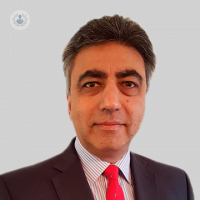How to manage acute diarrhoea in children
Written by:Diarrhoea has several potential causes but most often, bouts of diarrhoea are related to a ‘viral bug’ and quick to pass. Parents can ensure their child’s health is maintained by remaining vigilant about key factors such as hydration. Dr Assad Butt is incredibly experienced in treating paediatric gastroenterological conditions, including diarrhoea. Read on to discover how to know if your child has diarrhoea, how to manage it and when to seek medical help, if necessary.

Is it normal for children to have bouts of diarrhoea?
No, it isn’t normal for most children to have bouts of diarrhoea unless of course, they have been unlucky and caught a bug more than once. What's important first of all for parents is to understand what diarrhoea is. Stool consistency and frequency will vary depending on the age of the child and diet.
How do I know if my child has diarrhoea?
Often, people misinterpret what is medically classed as diarrhoea. Having diarrhoea means having a combination of both loose and frequent stools. In many cases, people incorrectly assume that one or two loose stool a day is diarrhoea.
A baby might be expected to have stool after every feed (generally 6-7 times a day), whereas an older child wouldn’t have one that frequently. Loose stool more than 3-4 times a day would suggest that a child has diarrhoea. This means that just one or two loose stool a day might not be diarrhoea.
What causes it?
The most common cause of acute diarrhoea is viral gastroenteritis (also referred to as the stomach bug, flu), most notably rotavirus and norovirus. Children experiencing diarrhoea will have their stool checked for bacteria and if the result is negative, medical professionals can safely assume the cause is a viral infection such as norovirus, rotavirus (the most common) or one of many other viruses which are not routinely tested for in clinical practice. Regardless of the virus, treatment will be the same.
If blood and mucus are in the stool, it may indicate a bacterial infection. The results of a stool sample, if positive for bacteria, will suggest which specific treatment is most suitable. Another potential cause is food poisoning. Consider if other family members have been unwell, particularly if food has been shared, or if your child has eaten something from their environment (e.g. from the garden).
How is it managed?
With acute diarrhoea, the key thing to assess is hydration. This can be done by answering a few key questions:
- Is your child passing urine normally? Are they wetting nappies as frequently as normal?
- Are their mouth and tongue moist?
- Are they drinking water and or keeping fluids down without vomiting?
- Are they alert? (being lethargic can be symptomatic of serious dehydration)
If your child shows any or a combination of the above criteria, focus on giving them more fluids to rehydrate their body. Children with acute viral gastroenteritis who need rehydration may benefit from an oral rehydration solutions (ORS). ORS preparations can be prescribed by your doctor or purchased from a pharmacy and made up according to the instructions; they must be given on their own initially (12-24 hours), regularly and in a volume appropriate for the age of your child and level of dehydration.
It’s also recommended to avoid food that could further irritate the bowels, but typically for no longer than 12-24 hours. Very rarely are children referred to a doctor for acute diarrhoea. However, if they are unable to keep fluids down, are lethargic and/or vomiting, seek help from a GP or specialist. Also, if symptoms persist after a week or two, having your child assessed by a medical professional is recommended.
How long does acute diarrhoea last?
Acute diarrhoea and its symptoms are short-term and will usually last for only a few days. If it lasts more than two weeks, it is considered chronic. Click here for Dr Butt’s article focused on the management of chronic diarrhoea in children.
The most important thing is to ensure that a child with diarrhoea stays hydrated and if this isn’t possible despite efforts to rehydrate, seek medical help with your doctor or take them to the emergency department.
Dr Assad Butt has over 18 years’ experience working as a consultant in paediatric gastroenterology. Click here to discover how he can help you look after your child’s wellbeing.


